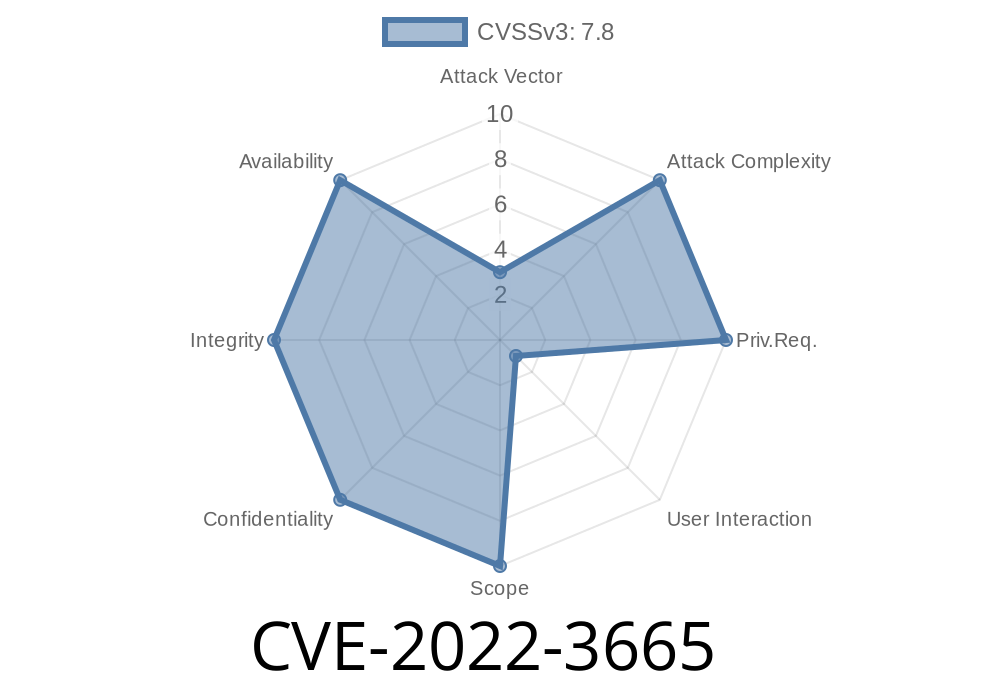In late 2022, a serious vulnerability surfaced in the Axiomatic Bento4 multimedia library—a tool widely used for parsing, editing, and packaging MP4 files and other related multimedia formats. CVE-2022-3665 points to a heap-based buffer overflow located in the avcinfo tool, specifically within AvcInfo.cpp. This vulnerability is rated critical since it opens the door to remote code execution if exploited correctly. Its public exploit availability makes it a pressing concern for anyone relying on Bento4.
This article breaks down what happened, shows the underlying issue, demonstrates risk through clear code snippets, and provides steps for remediation.
What Is Axiomatic Bento4 and avcinfo?
Bento4 is a C++ library and command-line toolset for reading, writing, and processing MP4 files. The avcinfo tool is included for extracting details about AVC/H.264 video tracks within those files.
Where's the Problem? (AvcInfo.cpp)
The vulnerability identified as CVE-2022-3665 (also tracked as VDB-212005) is in the way avcinfo processes malformed or maliciously crafted MP4 files.
Here's a dangerous scenario:
If the tool receives an invalid file, it reads data into a heap-allocated buffer, but does not properly check the buffer size against the incoming data. If the file is longer or malformed, the program writes past the end of the allocated memory, causing a buffer overflow.
Let's look at a simplified example of the risky code in AvcInfo.cpp
// Simplified pseudo-code from AvcInfo.cpp
unsigned char *buffer = new unsigned char[size];
// ... read data from file into buffer ...
fread(buffer, 1, sizeFromFile, file);
// ... process data, sometimes using sizeFromFile for loops ...
// BAD: No check if sizeFromFile > size
for (size_t i = ; i < sizeFromFile; i++) {
// process buffer[i] -- but buffer may be too small
}
Data is read into the buffer, but the actual length (sizeFromFile) may be larger than intended.
- The loop processes data beyond the end of the buffer if the sizeFromFile value is too large, leading to writing or reading out-of-bounds: a classic heap-based buffer overflow.
Exploit Scenario
Attackers can exploit this overflow simply by providing a specially crafted MP4 file to a public-facing service or a user using the avcinfo command.
A working exploit has been published, for reference see
- Exploit Database - EDB-ID: 50924
- Packet Storm - Bento4 avcinfo Heap Buffer Overflow
An example Python script from the public exploit simply crafts an MP4 file with a specially set length that triggers the buffer overflow when avcinfo tries to read the data.
# Proof-of-concept: Generates a malformed MP4 (simplified)
with open('exploit.mp4', 'wb') as f:
f.write(b'\x00' * 2048)
# Add headers or sizes to trick avcinfo
f.write(b'MOOV')
f.write(b'\xff' * 4096) # Oversized data that gets parsed
Just running
avcinfo exploit.mp4
could exploit the overflow on a vulnerable system.
Update Bento4:
Download and use the latest version from the official project page.
Code Review:
If you use the Bento4 library in your own code, check all file length and buffer handling in custom logic.
Relevant code was improved to ensure bounds checking before memory allocation and reading input
if (sizeFromFile > size) {
// Handle error, don't read the data
return ERROR;
}
References & Further Reading
- CVE-2022-3665 NIST Detail
- VulDB VDB-212005
- Bento4 GitHub
- Exploit-DB - 50924
- Packet Storm Security Advisory
Conclusion
CVE-2022-3665 in Bento4's avcinfo is a dire vulnerability that is easy to exploit—requiring only a manipulated MP4 file and a vulnerable system. Due to public exploit code and how frequently Bento4 is used in multimedia software, updating your installations and systems is crucial.
Don't process untrusted media files with outdated Bento4 software, and update as soon as possible. If you're a developer, double-check your own code for similar buffer overflow patterns.
Timeline
Published on: 10/26/2022 19:15:00 UTC
Last modified on: 10/28/2022 15:16:00 UTC
